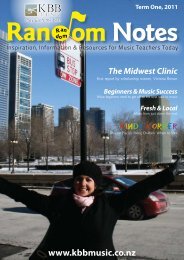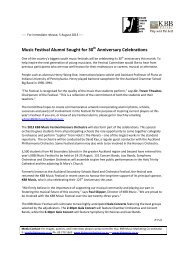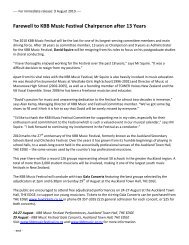choral briefs midwest clinic performance anxiety - KBB Music
choral briefs midwest clinic performance anxiety - KBB Music
choral briefs midwest clinic performance anxiety - KBB Music
You also want an ePaper? Increase the reach of your titles
YUMPU automatically turns print PDFs into web optimized ePapers that Google loves.
CHORAL BRIEFS<br />
Handy hints for Secondary School Choir Directors<br />
I Don't Believe You!<br />
by David Squire, Schoir Ltd<br />
David Squire. Photo: Tony Speakman<br />
In the Random Notes article last term I mentioned<br />
that there were two things separating singers from<br />
other musicians, the first being that the instrument is<br />
inside the body, rather than ‘attached’ to it. I didn’t<br />
reveal the second difference, but promised I would this<br />
term. It is, of course, the added dimension in almost all<br />
vocal music: text.<br />
This is a double-edged sword for singers. There are issues<br />
of mechanics: the pronunciation of varying languages,<br />
consonants that can interrupt the legato cantabile line,<br />
regional dialects that hinder correct vowel placement, and<br />
even something as basic as enunciating clearly enough<br />
to be understood by the audience. There are also issues<br />
of understanding: ambiguity and intuitive meaning in<br />
the poetic language (and this can include foreign poetic<br />
languages), accurate syllable accents, compositional<br />
context, and character conveyed via various emotive<br />
pathways.<br />
However, there is a huge advantage to having text: it is the<br />
singer’s primary guide to the musicality inherent in a song.<br />
In fact, it all starts from the text. Provided the composer<br />
has set the text in a way that reflects the intent of the<br />
words, it becomes the singer’s basis for finding the finesse<br />
of the <strong>performance</strong>.<br />
Unfortunately, all too often this is ignored. As a <strong>choral</strong><br />
adjudicator, I have heard many choirs sing works in<br />
such a way that I know they have no concept of the text<br />
“Singers in my choirs are all used to<br />
hearing me say a four-word phrase:<br />
'I don't believe you.' The moment I am not<br />
convinced that they are singing in a manner<br />
appropriate to the text, out it comes.”<br />
meaning. For example, how can one sing Vivaldi’s Gloria<br />
with a bored and serious face? If someone is singing the<br />
jazz standard I Can’t Give You Anything But Love, and they<br />
look disengaged and uncomfortable, then the audience<br />
(who effectively become the subject of the song) will not<br />
be inclined to give the singers a second chance. The mood<br />
in such a piece needs to be more alluring and less selfpitying!<br />
Singers in my choirs are all used to hearing me say a fourword<br />
phrase: “I don’t believe you.” The moment I am not<br />
convinced that they are singing in a manner appropriate<br />
to the text, out it comes. No doubt it annoys them, but it<br />
certainly keeps them honest, and usually has the desired<br />
effect – to remind them that integrity in singing is vital if<br />
they are to convey the message to the audience. It doesn’t<br />
matter if they believe it themselves or not. As singers they<br />
are required to convince the audience that they do, to<br />
suspend disbelief, in the same way that actors do. This<br />
requires a certain uninhibited approach to the music that<br />
many teenage singers find difficult to deal with, but must<br />
be encouraged to attempt and then perfect.<br />
12 Random Notes <strong>Music</strong>al Instrument Specialists since 1888
















